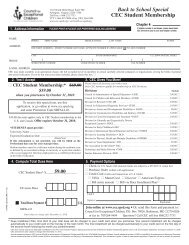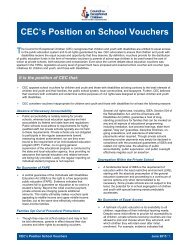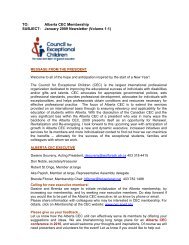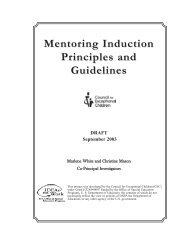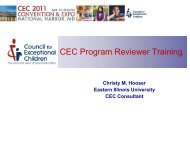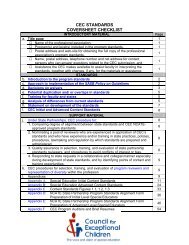What Every Must Know Special Educator - Council for Exceptional ...
What Every Must Know Special Educator - Council for Exceptional ...
What Every Must Know Special Educator - Council for Exceptional ...
Create successful ePaper yourself
Turn your PDF publications into a flip-book with our unique Google optimized e-Paper software.
activities, and interventions related to a positive<br />
school climate should address the needs and safety<br />
of adults as well as students.<br />
School-based implementation of antidiscrimination<br />
policies must equally support<br />
and provide open access <strong>for</strong> the participation<br />
of students in activities and student-led groups<br />
designed to enhance a respectful, safe, and positive<br />
school climate and to promote respect <strong>for</strong> diversity<br />
in general or with respect to one or more diversity<br />
elements.<br />
To support antidiscriminatory policies, schools<br />
should provide students, staff, and administrators<br />
with access to a range of resources, including<br />
designated professionals with expertise in<br />
intercultural and diversity-related counseling and<br />
human-relations.<br />
School policies should promote practices and<br />
curricula that build a sense of community and<br />
understanding <strong>for</strong> and among all students in<br />
recognition of the positive relationship between<br />
school climate, learning environments, and<br />
educational outcomes <strong>for</strong> all individuals.<br />
Professional development <strong>for</strong> educators and<br />
educational administrators should build schools’<br />
capacity to implement a diversity-rich curriculum<br />
as well as to respond effectively to instances of<br />
harassment, bullying, or intimidation. To this<br />
end, such activities should enhance educators’<br />
skills and strategies <strong>for</strong> effectively delivering<br />
culturally-sensitive educational experiences<br />
within the context of current standards-based<br />
curricula. Similarly, professional development <strong>for</strong><br />
administrators should develop their leadership<br />
skills and strategies <strong>for</strong> developing and<br />
implementing anti-discrimination policies and <strong>for</strong><br />
ensuring positive learning environments <strong>for</strong> all<br />
students. Schools should provide opportunities<br />
<strong>for</strong> parent education to complement professional<br />
development <strong>for</strong> educators.<br />
Teacher and educational leadership preparation<br />
programs should prepare educators,<br />
administrators, and related services personnel<br />
to create safe learning environments and to<br />
intervene effectively in the event that harassment<br />
or discriminatory behaviors occur. This includes<br />
understanding about the range of ways that schools<br />
can evaluate school climate comprehensively using<br />
evidence-based practices as well as how school<br />
climate findings can be used to build authentic<br />
learning communities that support positive youth<br />
development and academic achievement.<br />
ChAPTER 03<br />
SPECIAL EDuCATION WIThIN ThE<br />
SChOOLS<br />
Paragraph 1 - The Relationship Between<br />
<strong>Special</strong> and Regular School Programs<br />
<strong>Special</strong> education is an integral part of the total educational<br />
enterprise, not a separate order. In any school<br />
system, special education is a means of enlarging the<br />
capacity of the system to serve the educational needs<br />
of all children.<br />
The particular function of special education within<br />
the schools (and the education departments of other<br />
institutions) is to identify children with unusual needs<br />
and to aid in the effective fulfillment of those needs.<br />
Both regular and special school programs play a role in<br />
meeting the educational needs of children with exceptionalities.<br />
A primary goal of educators should be to<br />
help build accommodative learning opportunities <strong>for</strong><br />
children with exceptionalities in regular educational<br />
programs. In the implementation of this goal, special<br />
education can serve as a support system, and special<br />
educators can assist regular school personnel in managing<br />
the education of children with exceptionalities.<br />
When the special placement of a child is required,<br />
the aim of the placement should be to maximize the<br />
development and freedom of the child rather than to<br />
accommodate the regular classroom.<br />
<strong>Special</strong> education should function within and as a part<br />
of the regular, public school framework. Within this<br />
framework, the function of special education should be<br />
to participate in the creation and maintenance of a total<br />
educational environment suitable <strong>for</strong> all children.<br />
From their base in the regular school system, special<br />
educators can foster the development of specialized<br />
resources by coordinating their specialized contributions<br />
with the contributions of the regular school<br />
system. One of the primary goals of special educators<br />
should be the enhancement of regular school programs<br />
as a resource <strong>for</strong> all children.<br />
Paragraph 2 - Administrative Organization<br />
The system of organization and administration developed<br />
<strong>for</strong> special education should be linked with regular<br />
education (a) to increase the capability of the total<br />
Appendix 9: CeC profeSSionAl poliCieS 253



